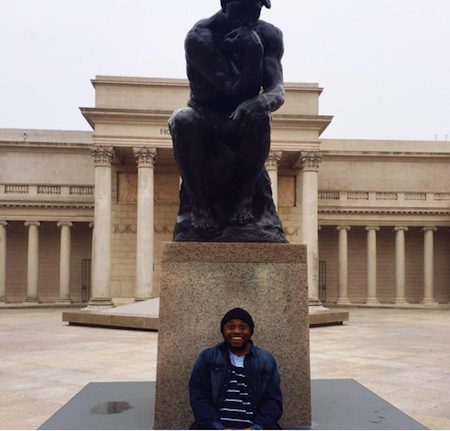What has been your favorite course and why?
“It was the Intro to Cultural Anthropology course that I took about ritual, culture, magic, shamanism, and religion; it was until we starting learning more in depth about race, class, and social stratification that I thought, this is it. This is what I like, it makes sense to me, and I vibe with this. I chose UCSC because it is a prestigious school that has that a small college feel to it that makes it possible for me to interact more with my instructors and to really get a sense of who they are as scholars and individuals. It’s that one on one that you don’t really get at other prestigious schools that have large class sizes that kind of prioritize graduate students. So, I benefit from it tremendously. Also, Santa Cruz is just a really cool place. Before I came here, before any of my classes, before I even transfer here, I wanted to talk to Nancy Chen. I wanted to pursue medical anthro, so what should I say to her? I saw that she was offering a class in the fall, so I emailed her that I was an incoming student and asked to see her syllabus and ever since that class it just feels right. I’m vibing with everything that she was talking about and it just made sense. The teachers here genuinely care about their students, like they really put it out there for their students to just come and see them and talk to them. It’s that very comforting feeling, sort of like a parent, with Nancy, she is very maternal, approachable, and personable. It makes you feel more included especially in this new environment. I’m 90 miles away from home, so it’s made my stay here much more enjoyable. Being a transfer is so different because I feel like a freshman that has to graduate in two years, it’s like a rush. Building those connections with professors is really helpful. I’m currently working on my senior thesis with my mentor, Nancy Chen, so it’s amazing how that worked out.”
What does Anthropology (biological, cultural, or archaeological) mean to you?
“I heard of it in high school, but I never had a deep understanding of what it was about. The start of my interest in Anthropology came from having incredible instructors that I have grown close to. It was mind opening, an incredible experience. Originally, I was going to pursue medicine, that was the goal, but it didn’t drive me. I wasn’t passionate about it, but I liked it. That was when I came across this Medical Anthropologist named Paul Farmer and this guy is everything, I want to be just like him, basically. It all started with that one class. Originally, I was super introverted and ever since I learned more about Paul Farmer, I’ve been crazy over anthropology ever since. I have a particular interest for Latin American, especially the Caribbean. My biggest goal is to start taking populations that have been deemed as invisible or culturally backwards and bring them to the forefront to show who they are as people. Not to say that I can put out these amazing pictures of who they are and that they need, but it’s just been too long of a process that has been erasing people’s histories and erasing them off of existence based on theories or perspectives. I want to study human beings and learn who they are as people and if they are being erased, the lease I can do is to try to bring them back to the forefront and have people look and say hey, you guys have forgotten about them. It’s easy for them to be forgotten because the media won’t put it out there, or they’ll frame them, for example intercity neighborhoods that have particular images of someone who murdered or people fighting or poverty. They are just being framed as these set ‘things’ and there is so much more to offer within many of these communities and people just simply don’t know. We are so quick to otherize here. In order to get a sense of who someone is, you need to keep your mind open, appreciate, and respect them. I would like to be a professor one day whether it is at a university campus or at a community college campus because I believe that Anthropology needs to be present. It is so important. Anthropology has taught me to question everything. You have gotta go in with an open mind and to be receptive to everything or else you will limit yourself.”

